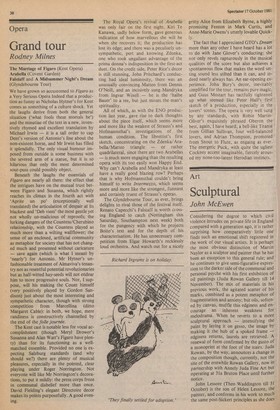Opera
Grand tour
Rodney Milnes
The Marriage of Figaro (Kent Opera) Arabella (Covent Garden) Falstaff and A Midsummer Night's Dream (Glyndebourne Tour) We have grown so accustomed to Figaro as a Very Serious Opera Indeed that a production as funny as Nicholas Hytner's for Kent comes as something of a culture shock. Yet the laughs derive from both the general situation ('what fools these mortals be') and the minutiae of the text in a new, inventively rhymed and excellent translation by Michael Irwin — it is a tall order to cap Dent's version of Antonio's line about the non-existent horse, and Mr Irwin has filled it splendidly. The only visual humour imposed from outside is some business with the severed arm of a statue, but it is so hilarious that only the most determined sour-puss could possibly object.
Beneath the laughs the essentials of Figaro are nearly all there: the effect that the intrigues have on the mutual trust between Figaro and Susanna, which rightly reaches its climax in the fourth act with 'Aprite un po' (exceptionally well translated) the articulation of despair at its blackest and `Deh vieni' the most gentle yet not wholly un-malicious of reproofs; the lurking dangers of the Countess/Cherubino relationship, with the Countess played as much more than a wilting wallflower; the sense of an enclosed, artificial community as metaphor for society that has not changed much and presented without caricature — save again (which is what I meant by 'nearly') for Antonio. Mr Hytner's unfashionable treatment of Almaviva's tenantry not as resentful potential revolutionaries but as half-witted hay-seeds will not endear him to more progressive souls. Nor, I suppose, will his making the Count himself (very positively played by Gordon Sandison) just about the most interesting and sympathetic character, though with strong competition from Marcellina (ditto Margaret Cable): in both, we hope, mere randiness is constructively channelled by the end of the folk journee.
The Kent cast is notable less for vocal accomplishment (though Meryl Drower's Susanna and Alan Watt's Figaro have plenty) than for its functioning as a wellmatched ensemble. Provided no one is expecting Salzburg standards (and why should we?) there are plenty of musical pleasures, especially in the pointed, clear playing under Roger Norrington. Not everyone will like Mr Norrington's decorations, to put it mildly: the press corps froze in communal disbelief more than once. David Fielding's elegant Directoire decor makes its points purposefully. A good evening. The Royal Opera's revival of Arabella was only fair on the first night. Kin i Te Kanawa, sadly below form, gave generous indication of how marvellous she will be when she recovers it; the production has lost its edge; and there was a peculiarly unsympathetic, pert and knowing Zdenka, one who took ungallant advantage of the prima donna's indisposition in the first-act duet. On the credit side, Peter Rice's decor is still stunning, John Pritchard's conducting had ideal luminosity, there was an unusually convincing Matteo from Dennis O'Neill, and an incisively sung Mandryka from Ingvar Wixell — he is the 'halbe Bauer' to a tee, but just misses the man's spirituality.
All of which, as with the ENO production last year, gave rise to dark thoughts about the piece itself, which seems more and more like the weakest of Strauss's and Hofmannsthal's investigations of the human condition. The librettist's first sketch, concentrating on the Zdenka/Arabella/Matteo triangle — or rather quadrilateral, since there are two Arabellas — is much more engaging than the resulting opera with its too easily won Happy End. Why can't Arabella and Mandryka at least have a really good blazing row? Perhaps that is why Hofmannsthal couldn't bring himself to write Intermezzo, which seems more and more like the strongest, funniest and certainly truest of Strauss's operas.
The Glyndebourne Tour, as ever, brings delights to rival those of the festival itself. Renato Capecchi's Falstaff is worth ci ossing England to catch (Nottingham this Saturday, Southampton next week) both for the pungency with which he projects Boito's text and for the depth of his characterisation. He has unnecessary competition from Elgar Howarth's recklessly loud orchestra. And watch out for a nicely gritty Alice from Elizabeth Byrne, a highly promising Fenton in Mark Curtis, and Anne-Marie Owens's utterly lovable Quickly.
The fact that I appreciated GTO's Dream more than any other I have heard has a lot to do with Jane Glover's conducting: she not only revels rapturously in the musical qualities of the score but also achieves a spontaneous flow that makes the word setting sound less stilted than it can, and indeed nearly always has. An ear-opening experience. John Bury's decor, inevitably simplified for the tour, remains pure magic, and Guus Mostart has tactfully tightened up what seemed like Peter Hall's first sketch of a production, especially in the lovers' scenes. The opera is very well sung by any standards, with Robin MartinOliver's exquisitely phrased Oberon the best, again, I have heard, a bell-like Titania from Gillian Sullivan, four well-balanced lovers, and Adrian Thompson, promoted from Snout to Flute, as engaing as ever. The energetic Puck, with quite the ugliest Cockney accent imaginable, fiercely aroused my none-too-latent Herodian instincts.






































 Previous page
Previous page